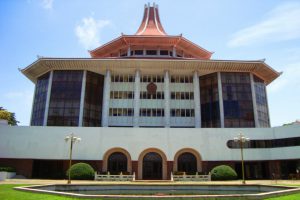Court of Appeal of Sri Lanka: Application under Article 140 of the Constitution of the Democratic Socialist Republic of Sri Lanka was contemplated by Yasantha Kodagoda and Arjuna Obeyesekere, JJ. for issuance of Writs of Certiorari, Prohibition and Mandamus.
The factual matrix of the case was that the petitioner filed an application where he sought certiorari against the respondent- Inspector General of Police, in lieu to quash the decision of dismissal of the petitioner from the Police Department. Such dismissal order was passed because; a complaint was filed against the petitioner who was a Sub-Inspector, for the illicit relationship with a married woman. The complainant was the husband of the woman with whom the petitioner was in the alleged relationship. The complainant had detained the petitioner when he was found in his house.
A preliminary investigation was conducted and a charge sheet was filed accordingly. It was stated that in the investigations carried out by the Police Department it was revealed that the Petitioner had made an entry in the Information Book that he left the Station to attend lectures at the University of Sri Jayawardenapura. However, inquiries had revealed that, instead the Petitioner had visited the wife of the complainant on that particular day. It was further examined by the Court that all the charges were based on the petitioner who made a false entry in the information book and thereafter had engaged in an illicit relationship with the wife of the complainant and also duping her with an amount of Rs 50,000. He was charged for violating the disciplinary code and bringing the Police Service to disrepute. Eventually, he was found guilty by the Court. Although the Inquiry Officer had only recommended, by way of punishment, the suspension of salary increments and promotions due to the Petitioner, the Senior Deputy Inspector General in charge of the Petitioner had recommended that the services of the Petitioner be terminated as provided for in Section 24:3:2 of Chapter XLVIII of the Establishments Code, as the Petitioner was still under probation at the time the aforementioned incident occurred.
The Court had examined the said provision of the Establishments Code and found that the said recommendation was in terms of the Establishments Code. The Inspector-General of Police had agreed with the said recommendation and by a Disciplinary Order, petitioner to be terminated from the services.
Petitioner then appealed to the National Police Commission which had dismissed his appeal. Aggrieved by which he again appealed to the Administrative Appeals Tribunal, where his appeal was dismissed. The counsel for the petitioner submitted that although the charge sheet contained seven charges, the Inquiry Officer had found the Petitioner ‘guilty’ of only three charges. He further submitted, however that the Senior Deputy Inspector General of Police, the Inspector General of Police, the National Police Commission and the Administrative Appeals Tribunal have all proceeded on the basis that the petitioner had been found guilty of all seven charges, thus, was an error on the face of the record and vitiated their finding.
The Court, observed that the Inquiry Officer had dealt with all the charges and found him guilty of the relevant ones. Thus, the Inquiry Officer has, in fact, found the Petitioner ‘guilty’ of all charges, but had grouped the charges under three heads in his conclusion. The Court further observed that, it was clear to the Court that the Inquiry Officer was satisfied with the core offence – i.e. making a false entry and engaging in conduct unbecoming of a Police officer – which was common to all charges, had been established. It was held that, “Although the Inquiry Officer was required to record his conclusions on each charge separately, no prejudice has been caused to the Petitioner by the course of action adopted by the Inquiry Officer in lumping together charges of a similar nature. The Administrative Appeals Tribunal too has proceeded on the basis that the Petitioner has been found guilty of the principal allegation made against him. In these circumstances, this Court does not see any merit with the submission of the learned Counsel for the Petitioner.”
Hence, the Court found no merits in the application of the petitioner and found him guilty of the said conduct. The application was dismissed.[Ranawana Wedaralalage v. C.D. Wickramaratne, 2019 SCC OnLine SL CA 8, decided on 17-09-2019]

